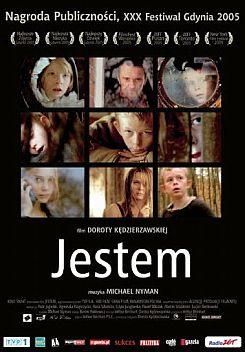
After runing away from a children's home, with only himself to rely on, Kundel tries to cope with living on his own, knowing despite everything that there is a different, better world out there. Perhaps this knowledge gives him strength and hope, allows him to dream, believe, and be. These are not dreams of an affluent life, but a full life. The boy senses that real, adult life has started for him, and that he has to endure this test. He is self-sufficient and independent, and does his best to defend that independence.
Kundel finds himself a "home" on an old abandoned barge. He makes friends with a girl who lives nearby in a real and affluent home. Both for him and for her, this accidental meeting brings not only a first fascination, or even infatuation, but also a great, wonderful discovery - you don't necessarily have to be alone in the world. If you're lucky, you can find other people who feel what you feel, have similar dilemmas, and the same perception of the world.
"Jestem" is a film made with sensitivity and moderation, never exaggerating reality. Even so, the truth about that reality is harsh. The world of adults is a degenerated and cold world. Adults have no compunction about drowning unwanted kittens, and try to drown their sorrows in alcohol. That's why Kundel is a character who amazes us and makes us feel ashamed. In Kędzierzawska's film, not for the first time, it is children who try to salvage the remnants of humanity - as if in spite of everything and everyone. Kundel in shoes kept together with sticky tape, stealing bread from a shop window, becomes a heroic figure, surpassing everyone around him despite his 11 years of age, surpassing the hopelessness of the squalid Polish city outskirts where he once had the bad luck to be born.
- Anita Piotrowska, Tygodnik Powszechny, 30 November 2005
Almost all of Dorota Kędzierzawska's films are based on facts. Jestem / I am was also inspired by real events that Kędzierzawska read about in a newspaper. In February 2002, Łódź police detained a young teenager who had run away from a children's home and then lived for six months in a barrack right next to a housing estate. The residents knew about the "squatter", but no one thought to take an interest in him. Nobody was surprised by his presence, which actually was not particularly troublesome.
In the script, Kędzierzawska built the character of Kundel as a combination of that boy from the barrack whom she didn't know personally and a 9-year-old she once met by accident in the centre of Łódź. With the boy "from the paper", Kundel shares his lonely living in an isolated spot. In the film the barrack on a housing estate has been replaced with a river barge. The film was shot in Chełmno near Toruń.
The film's producer is Artur Reinhart, who is also the cinematographer and who edited the film together with Kędzierzawska. It took 43 days to shoot - from 13 October to 6 December 2004. The music for the film was composed by Michael Nyman.
The film won the Audience Award at the 30th Polish Featur Film Festival in Gdynia (2005) as well as the awards for Best Cinematography (Artur Reinhart), Best Music (Michael Nyman), and Best Sound (Bartek Putkiewicz). It also received an award from the jury of the 29th Kinderfilmfest Berlinale 2006, and the Award of the President of the Italian Republic - second place in the "Free to Fly" section at the 36th Giffoni Film Festival in Italy.
- Jestem / I am, Poland, 2005. Screenplay and directed by Dorota Kędzierzawska, director of photography: Artur Reinhart, music by Michael Nyman, film editing by Artur Reinhart, Dorota Kędzierzawska, production design by Monika Konarzewska, costume design by Mariola Dziomdziora, casting: Magdalena Daniel, sound: Bartek Putkiewicz, producer: Artur Reinhart. Featuring: Piotr Jagielski (Kundel), Agnieszka Nagórzycka (Kuleczka), Edyta Jungowska (Mother), Paweł Wilczak (Kuleczka's Father), Marcin Sztabiński (Chudy). Produced by TVP S.A., KID Film, ORKA Film and Panavision Polska. 95 min.
Source: http://film.onet.pl